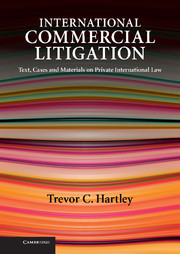Book contents
- Frontmatter
- Contents
- Table of panels
- List of figures
- Preface
- Acknowledgments
- Terminology
- Table of Latin phrases
- List of abbreviations
- Table of cases
- Table of cases (European Court of Justice, numerical order)
- Table of legislative instruments
- PART I STARTING OFF
- PART II JURISDICTION
- PART III FOREIGN JUDGMENTS
- PART IV PROCEDURE
- 19 Freezing assets
- 20 Obtaining evidence abroad: forum procedures
- 21 Obtaining evidence abroad: international co-operation
- PART V CHOICE OF LAW
- PART VI EXTRATERRITORIALITY
- Bibliography
- Index
21 - Obtaining evidence abroad: international co-operation
from PART IV - PROCEDURE
- Frontmatter
- Contents
- Table of panels
- List of figures
- Preface
- Acknowledgments
- Terminology
- Table of Latin phrases
- List of abbreviations
- Table of cases
- Table of cases (European Court of Justice, numerical order)
- Table of legislative instruments
- PART I STARTING OFF
- PART II JURISDICTION
- PART III FOREIGN JUDGMENTS
- PART IV PROCEDURE
- 19 Freezing assets
- 20 Obtaining evidence abroad: forum procedures
- 21 Obtaining evidence abroad: international co-operation
- PART V CHOICE OF LAW
- PART VI EXTRATERRITORIALITY
- Bibliography
- Index
Summary
Introduction
The normal method of obtaining the assistance of a foreign court is through letters of request, also known as letters rogatory. English and American courts, like other common-law courts, will respond to such requests, even if there is no convention obliging them to do so; in other countries, however, such a convention may be a pre-condition. Many conventions exist; most are bilateral, but some are multilateral. By far the most important is the Hague Convention of 18 March 1970 on the Taking of Evidence Abroad in Civil or Commercial Matters. It is in force in over forty States, including the United Kingdom, the United States, China, Russia, India and most European countries.
The Convention may be used to obtain both documentary and oral evidence. As its name indicates (and as is specified in Article 1), it applies only in ‘civil or commercial matters’, a phrase to which we shall return. It may be used only to obtain evidence to be put before a court in judicial proceedings: it cannot be used to obtain evidence for an investigation; nor may it be used to obtain documents that will not themselves constitute evidence, even if they lead to other documents that will constitute evidence. The proceedings do not have to have commenced at the time of the request, but they must at least be contemplated.
- Type
- Chapter
- Information
- International Commercial LitigationText, Cases and Materials on Private International Law, pp. 477 - 500Publisher: Cambridge University PressPrint publication year: 2009



